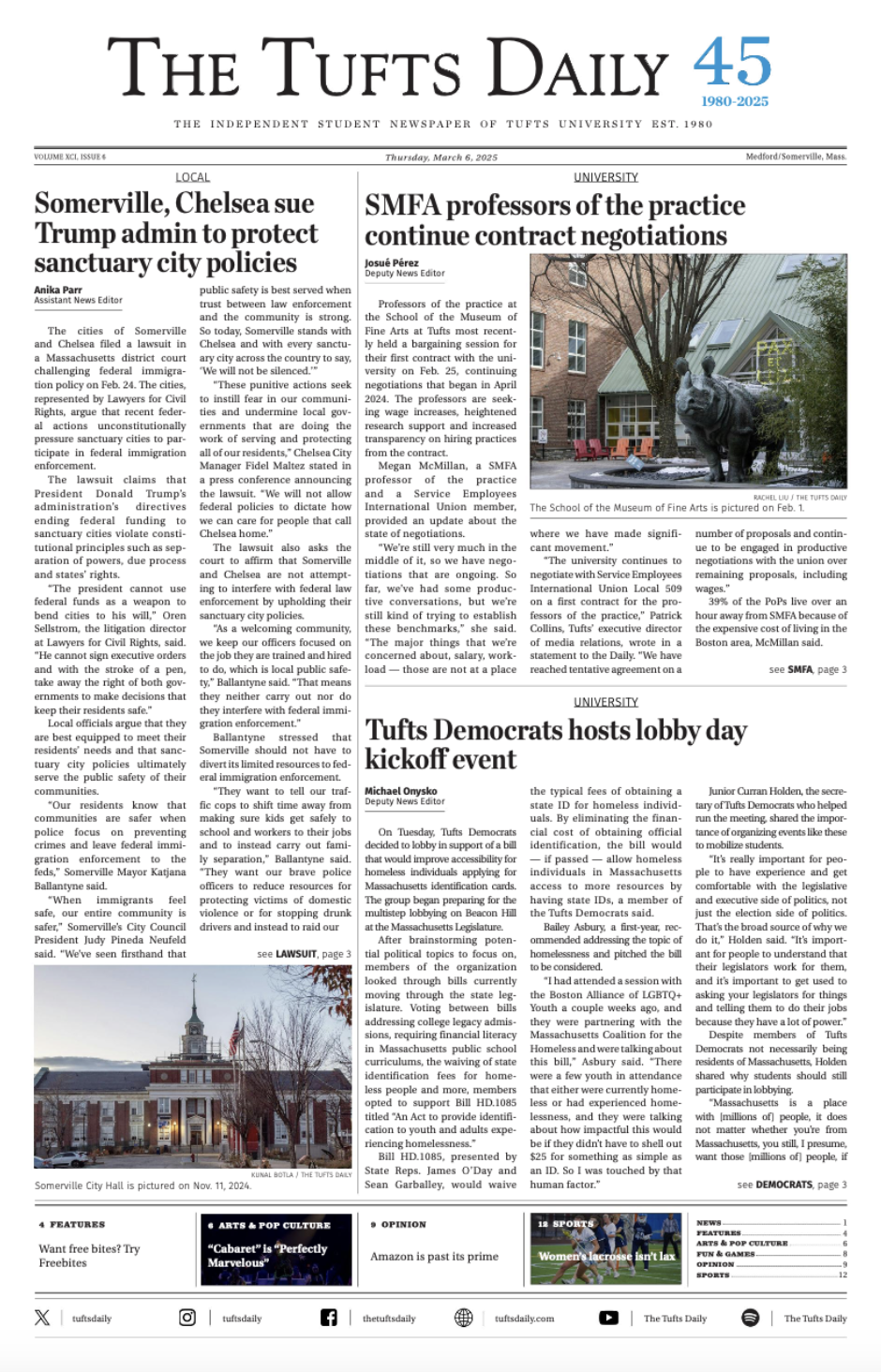Effective next semester, Leila Fawaz and Rob Hollister will no longer serve as deans, but will both remain at Tufts in order to dedicate more time and energy towards teaching.
Both Fawaz, who served as the Dean of Arts and Humanities for the last five years, and Hollister, who was the Dean of the Graduate School and Professional and Continuing Studies for five years, did teach during their tenure as deans. But the two administrators say they are ready to devote more time to other projects.
"I am not returning to my academic work, because I never stopped during my deanship," Fawaz said. "After five years, unless you decide to become a dean as your career, it is okay to return to a more active academic life."
Fawaz, a social historian of the Middle East, currently holds a joint appointment as a history professor at Tufts and a professor of diplomacy at the Fletcher School of Law and Diplomacy. Hollister will work full-time at the University College of Citizenship and Public Service (UCCPS).
It remains unclear who will replace the deans, though Vice President of Arts, Sciences, and Engineering Mel Bernstein indicated in a memo to faculty that he is open to suggestions. Bernstein is examining not only how the positions would be best filled, but also how to potentially change the responsibilities of the deans.
Fawaz helped organize numerous projects over the past several years in both diplomacy and arts and humanities, and coordinated events between the Fletcher School and the international relations undergraduate program. She worked on the Humanities & Arts Newsletter, the Millenium Project, and the "Humanities and Arts on Film" program. Fawaz also maintains international contacts as a member of the editorial board of the British Journal of Middle Eastern Studies and as the editor for Columbia University Press's History and Society of the Modern Middle East series.
In her role as Dean of the Arts and Humanities and the Associate Dean of the Faculty, Fawaz emphasized the importance of becoming acquainted with both full-time and part-time faculty members.
"The deanship broadens your horizon," she said. "You think globally on how to bring areas together. If you take a theme and bring everyone around that theme, each department looks at the theme differently."
Fawaz pointed out the need to reflect the diversity of both American and international minorities in the Tufts curriculum and community. "This is a must in the job of a dean," she said.
Fawaz will continue teaching at both Tufts and Fletcher, but not until the fall of 2002. She will remain on campus next year, developing a workshop with a Harvard colleague concerning World War II and similar themes. Fawaz hopes to continue building the University's profile. "I am interested in connections between areas of study," she said.
Also an accomplished member of the Tufts faculty, Hollister's area of expertise is urban environmental policy and planning. He recently organized a comprehensive review of the graduate schools, providing important recommendations for a plan for improvement of these programs.
In the past one-and-a-half years, Hollister has balanced both his deanship and his work on the UCCPS, Tufts' two-year-old school of public service. "Economists say it is a matter of opportunity cost. I am now ready to spend 140 percent of my time on UCCPS," Hollister said.
"The UCCPS is the center of my interests. My mission has been defining the focus of my career before the UCCPS was created at Tufts. It is an important program for me, personally, and presents a wonderful opportunity for Tufts University," he added.
After serving as a dean for the past five years, Hollister thinks it is imperative to secure a new dean for the Arts and Sciences graduate school. "There are some important new challenges facing the Arts and Sciences programs in the coming period of time," he said.
Hollister now looks forward to helping further the UCCPS program. The UCCPS's focus, he said, is to concentrate on the participation of the undergraduate and graduate programs in order to coordinate a truly university-wide initiative. Hollister plans to spend more time on fundraising and developing partnerships with the University's outside programs in an effort to expand and sustain the UCCPS, which recently received a generous grant from Tufts alum and E-Bay founder Pierre Omidyar and wife Pam.
"The UCCPS will not be financially supported by school funding because the program is new and it has the capacity to draw on other resources," Hollister said. "There has been an increasing level of discussion with people from national groups. Their level of excitement about our efforts with the UCCPS here is high."
Outside of Tufts, the UCCPS is gaining attention. "Officials out of the University see the UCCPS as a unique new model of citizenship and public service," Hollister said.
Switching roles within the University does not seem difficult to Hollister. "It is just a different balance and will have more focus on the UCCPS initiative," Hollister said. "When you become an administration member, you miss the research and teaching."





